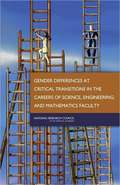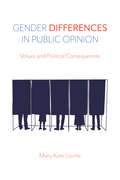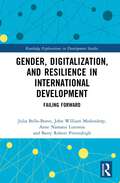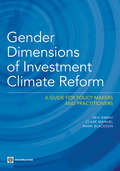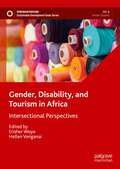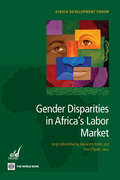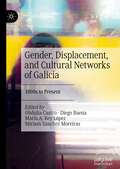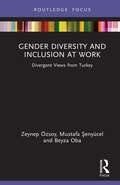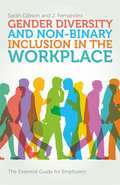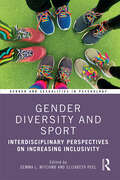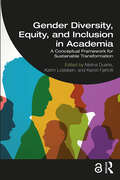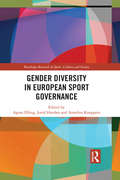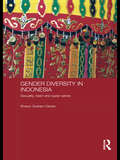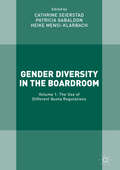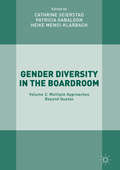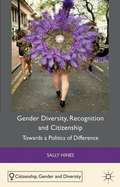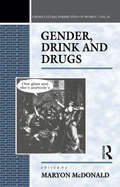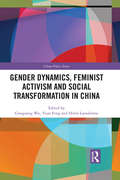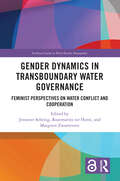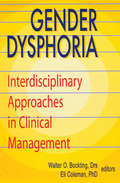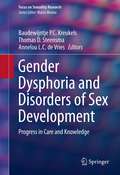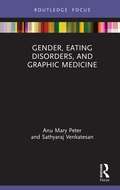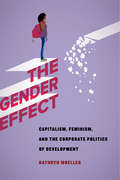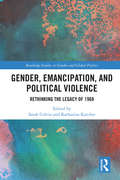- Table View
- List View
Gender Differences at Critical Transitions in the Careers Of Science, Engineering, and Mathematics Faculty
by National Research Council of the National AcademiesGender Differences at Critical Transitions in the Careers of Science, Engineering, and Mathematics Faculty presents new and surprising findings about career differences between female and male full-time, tenure-track, and tenured faculty in science, engineering, and mathematics at the nation's top research universities. Much of this congressionally mandated book is based on two unique surveys of faculty and departments at major U.S. research universities in six fields: biology, chemistry, civil engineering, electrical engineering, mathematics, and physics. A departmental survey collected information on departmental policies, recent tenure and promotion cases, and recent hires in almost 500 departments. A faculty survey gathered information from a stratified, random sample of about 1,800 faculty on demographic characteristics, employment experiences, the allocation of institutional resources such as laboratory space, professional activities, and scholarly productivity. This book paints a timely picture of the status of female faculty at top universities, clarifies whether male and female faculty have similar opportunities to advance and succeed in academia, challenges some commonly held views, and poses several questions still in need of answers. This book will be of special interest to university administrators and faculty, graduate students, policy makers, professional and academic societies, federal funding agencies, and others concerned with the vitality of the U.S. research base and economy.
Gender Differences in Aspirations and Attainment
by Ingrid Schoon Jacquelynne S. EcclesWhat is the role of parents, peers and teachers in shaping school experiences and informing the career choice of males and females? Does the school context matter, and to what extent do educational experiences influence young people's self-concept, values and their outlook to the future? Do teenage aspirations influence later outcomes regarding educational attainment and the assumption of work and family related roles? These questions and more are addressed in the chapters of this book, following lives over time and in context. The book is both innovative and timely, moving the discussion of gender inequalities forward, providing a dynamic and contextualized account of the way gendered lives evolve. Chapters address the role of institutional structures and the wider socio-historical context in helping young men and women to realize their ambitions. A unique feature is the longitudinal perspective, examining the role of multiple interlinked influences on individual life planning and attainment.
Gender Differences in Public Opinion: Values and Political Consequences
by Mary-Kate LizotteIn this era in which more women are running for public office—and when there is increased activism among women—understanding gender differences on political issues has become critical. In her cogent study, Mary-Kate Lizotte argues that assessing the gender gap in public support for policies through a values lens provides insight into American politics today. There is ample evidence that men and women differ in their value endorsements—even when taking into account factors such as education, class, race, income, and party identification. In Gender Differences in Public Opinion, Lizotte utilizes nationally representative data, mainly from the American National Election Study, to study these gender gaps, the explanatory power of values, and the political consequences of these differences. She examines the gender differences in several policy areas such as equal rights, gun control, the death penalty, and the environment, as well as social welfare issues. The result is an insightful and revealing study of how men and women vary in their policy positions and political attitudes.
Gender, Digitalization, and Resilience in International Development: Failing Forward (Routledge Explorations in Development Studies)
by Julia Bello-Bravo John William Medendorp Anne Namatsi Lutomia Barry Robert PittendrighThis book explores the intersection of gender, digitalization, and resilience in international development. Building resilience is increasingly seen as crucial when planning and implementing development programmes, enabling communities to mitigate, adapt to, and recover from shocks and stresses in a manner that reduces chronic vulnerability and facilitates inclusive growth. Gender plays a crucial role in the resilience of development systems, as the exclusion of women from participation can make communities more vulnerable to economic shocks, perpetuating and even worsening current levels of poverty, instability, and insecurity. Drawing on meta-data from across the world, as well as specific case studies from Ghana, Kenya, Burkina Faso, and Mozambique, this book reflects on these intersections and the potential of digitalization as a democratizing tool for improving the access of women and other marginalized groups to information vital for their participation in the process of development. By outlining the importance of digitalization for addressing gender imbalances, this book draws the evidentiary lines between the role of digitalization for women and resilience as a whole. This book will be of interest to development practitioners and policy makers, as well as researchers with specialisms in gender inclusion, resilience, digitalization, and international development.
Gender Dimensions of Investment Climate Reform: A Guide for Policy Makers and Practitioners
by Sevi Simavi Clare Manuel C. Mark BlackdenThe economic empowerment of women is increasingly seen as one of the most important forces behind economic growth and the fight against poverty. Indeed, women's economic participation in an economy as entrepreneurs, employees, and leaders is recognized as a measure of a country's dynamism and viability. 'Gender Dimensions of Investment Climate Reform' provides fresh solutions to common issues that women entrepreneurs face. It presents actionable, replicable, and scalable tools for promoting gender-sensitive investment climate reforms that would benefit both women and men. The book enables development practitioners and policy makers who are not gender specialists to diagnose gender issues in an investment climate; design creative and practical solutions and recommendations for addressing gender constraints; and monitor and evaluate the implementation of those recommendations.
Gender, Disability, and Tourism in Africa: Intersectional Perspectives (Sustainable Development Goals Series)
by Erisher Woyo Hellen VenganaiThis book explores the intersection of gender and disability in the context of tourism. In part, the book foregrounds feminist theorising of intersectionality by examining how gender can overlap with other social identities to contribute to more systemic oppression, domination, discrimination, and marginalisation of certain categories of people. Our point of departure is that disability does not operate in isolation as it is constituted and experienced within an already gendered social and tourism environment. With substantial research on the intersection of gender and tourism on the one hand, and the intersection of disability and tourism on the other hand, the interconnectedness of gender and disability and the implications this has on tourism policy and practice remains understudied. Thus, the book provides a critical lens that helps unpack underlying assumptions about gender and disability while questioning the dominant ideas about gender and disability reproduced through tourism policies and institutional practices in an African context. This book will be of interest to scholars and researchers in Gender Studies, Disability Studies, and Tourism Studies, particularly those with a research interest in Africa.
Gender Disparities in Africa's Labor Market
by Jorge Saba Arbache Alexandre Kolev Ewa FilipiakWomen's earnings are a fraction of male's earnings in several African countries. It is tempting to conclude that this wage gap is a sign of discrimination against women in the labor market. Yet this book uses new datasets to show that the gap is not simply the result of discrimination in the labor markets, but rather the result of multiple factors, including access to education and credit, cultural values and household duties, and, above all, labor market conditions. It shows that gender disparities grow when economies are not functioning well and labor markets are tiny. More than the effect of discrimination, it seems that job rationing causes those with better human capital and those with more power in the household-usually the men-to take the few jobs that are available. It is hardly surprising, then, that in a region where only a fraction of the labor force finds jobs in the formal sector, gender disparities in earnings are so high. The book further documents that firm-level and sector characteristics are additional powerful factors in explaining the gender disparities in the labor market. As the causes are not simple, neither are the solutions; multifaceted strategies are needed. By providing environments that support economic growth and, more importantly, job creation, as well as by promoting equal access for women to education and rethinking the attitudes that limit what women may achieve, governments in the region will substantially improve the well-being of all their peoples. 'Gender Disparities in Africa's Labor Market' helps to fill the knowledge gap and identify the links between gender disparities and poverty reduction. The work was implemented in collaboration with a range of poverty and labor market studies to maximize its usefulness for policy dialogue in specific countries. This book will be of interest to policy makers, students, academics, gender experts, and all those interested in gender issues and development.
Gender, Displacement, and Cultural Networks of Galicia: 1800s to Present
by Obdulia Castro Diego Baena María A. Rey López Miriam Sánchez MoreirasThis book, bringing together a multi-voiced dialogue between academic scholars and professionals from diverse fields, shares a comprehensive and heterogeneous look at the interdisciplinarity of Galician Studies while examining a chronologically broad range of subjects from the 1800s to the present. This volume carves out a distinct approach to gender studies investigating issues of culture, language, displacement, counterculture artists, and community projects as related to questions of politics, gender and class. Women, conceived as both individual and political bodies, are studied, among other things, as an example of what it means to struggle from the margins emphasizing the importance of looking at the opposition between the center and the peripheries when studying the relationship between space and culture.
Gender Diversity and Inclusion at Work: Divergent Views from Turkey (Routledge Focus on Business and Management)
by Zeynep Özsoy Mustafa Şenyücel Beyza ObaThe purpose of this book is to investigate gender diversity practices and discourse developed by listed companies in Turkey. It pursues this aim by advancing knowledge about business relations affecting workplace gender diversity. The research builds on Bourdieu’s field approach and implements a Thematic Analysis following Braun and Clarke’s (2006) guidelines. The findings of the book are based on data collected from unstructured interviews and secondary sources such as the official documents of national and international organizations, newspapers, legislation, and web pages of the related parties. The findings suggest that the implementation of gender diversity practices may require a transformation of perspective and the conditions regarding the political, economic, and cultural realm for realization of a pervasive movement. Due to the conservative and patriarchal culture, authoritarian rule and neoliberal policies, gender diversity and inclusion are not seen as issues that should be resolved through the commitment and collaboration of a field. Consequently, diversity management practices are instrumentalized by the business community as a means for corporate communication and image building rather than actively building a diverse workforce.
Gender Diversity and Non-Binary Inclusion in the Workplace: The Essential Guide for Employers
by Sarah Gibson J. FernandezHelping to create inclusive work environments for non-binary people, this book builds knowledge of non-binary identities and provides practical solutions to many of the basic workplace problems this group face. Working with and including non-binary people in the workplace is beneficial for both employer and employee, as it attracts and retains younger and non-binary workers by helping promote an inclusive brand, as well as satisfying equality obligations. Based on novel research of non-binary inclusion within businesses, it provides a basic overview of non-binary people, a business case for inclusion, a brief description of how non-binary people fit into current equality laws and likely future developments in the area. An ideal introduction for companies wishing to embrace all genders in the workplace.
Gender Diversity and Sport: Interdisciplinary Perspectives (Gender and Sexualities in Psychology)
by Gemma L. WitcombThis timely and urgent text presents cutting-edge research exploring the complexities of barriers to inclusive access to sport and physical activity, and discusses how sport, and society, can move forward beyond the gender binary, in both theory and practice. Sport is one of the most influential, powerful, and visible institutions upholding the gender binary, even as the number of people identifying as transgender and non-binary increases rapidly worldwide. With this rising visibility, societal pressure has been increasing for the equal acceptance of gender diverse people, but while gains have been made in many areas, the participation of intersex, trans and non-binary people in sport remains harshly contested. Bringing together a world-leading team of established and emerging scholars from the UK, USA, and Australia, this collection presents an interdisciplinary analysis of current issues related to the participation of gender diverse individuals in sport and physical activity. Engaging with psychological ideas around identity, prejudice and discrimination, and sports psychology and performance, authors examine evidence that the rules, regulations, and practices that surround physical activity participation – from elite sport to sport in schools, universities, and society at large – are grounded in heteronormative, cisgendered, and sexist practices which unfairly discriminate against gender diverse people. Also including analysis of personal accounts from non-binary and transgender athletes from a range of sports, this is fascinating and essential reading for education, health, and sports professionals who work with and support gender diverse children and adults, as well as academics and students in the fields of psychology, sport psychology, sociology, law, and sports science, and those participating in, and navigating, sport and physical activity spaces.
Gender Diversity, Equity, and Inclusion in Academia: A Conceptual Framework for Sustainable Transformation
by Melina Duarte Katrin Losleben Kjersti FjørtoftInstitutional focus on diversity, equity, and inclusion affects all parts of higher education management. Gender Diversity, Equity, and Inclusion in Academia: A Conceptual Framework for Sustainable Transformation scrutinises the conceptual framework for diversity, equity, and inclusion actions in academia to facilitate research-based and critically reflected decisions in higher education management. The book contains 24 chapters, each focused on one of 24 fundamental concepts that are essential for identifying, understanding, and implementing organizational changes and counteracting unjustified disadvantages faced by women and members of other gender minorities in academia, preceded by an introductory binding chapter. The book also discusses concepts directed towards solutions, such as affirmative action and feminist pedagogies, and overcomes the traditional binary approach on gender by incorporating specific challenges faced by LGBTQ+ and transgender staff and students. Gender Diversity, Equity, and Inclusion in Academia will be key reading for academics in Gender Studies and Education Studies, while also serving as a vital resource for individual consumers working in or preparing to enter leadership positions in higher education.
Gender Diversity in European Sport Governance (Routledge Research in Sport, Culture and Society)
by Agnes Elling Jorid Hovden Annelies KnoppersGender equality is one of the founding democratic principles of the EU. However, recent studies of the Federation of Olympic Sports in Europe have shown that women occupy only fourteen percent of decision-making positions in sport organizations. This book presents a comprehensive and comparative study of how various regions and countries of Europe have addressed this lack of gender diversity, discussing which strategies have brought about change and to what extent these changes have been successful. With contributions from leading sport sociologists, covering countries such as Germany, Hungary, Norway, Poland, Spain, Turkey and the UK, it provides a foundation for future policymaking, methodological analyses and theoretical developments that can result in sustainable gender equality in European sport governance. Gender Diversity in European Sport Governance is important reading for scholars and students in the fields of sociology of sport, sport management, sociology, gender studies and studies of organization, management and leadership. It is also a valuable resource for policy makers in the EU, as well as national sport organizations and activists.
Gender Diversity in Indonesia: Sexuality, Islam and Queer Selves (ASAA Women in Asia Series)
by Sharyn Graham DaviesIndonesia provides particularly interesting examples of gender diversity. Same-sex relations, transvestism and cross-gender behaviour have long been noted amongst a wide range of Indonesian peoples. This book explores the nature of gender diversity in Indonesia, and with the world’s largest Muslim population, it examines Islam in this context. Based on extensive ethnographic research, it discusses in particular calalai – female-born individuals who identify as neither woman nor man; calabai – male-born individuals who also identify as neither man nor woman; and bissu – an order of shamans who embody female and male elements. The book examines the lives and roles of these variously gendered subjectivities in everyday life, including in low-status and high-status ritual such as wedding ceremonies, fashion parades, cultural festivals, Islamic recitations and shamanistic rituals. The book analyses the place of such subjectivities in relation to theories of gender, gender diversity and sexuality.
Gender Diversity in the Boardroom
by Cathrine Seierstad Patricia Gabaldon Heike Mensi-KlarbachThis edited collection provides a structured and in-depth analysis of the current use of multiple approaches beyond quotas for resolving the pressing issue of gender inequality, and the lack of female representation on corporate boards. Filling the gap in existing literature on this topic, the two volumes of Gender Diversity in the Boardroom offers systematic overviews of current debates surrounding the optimisation of gender diversity, and the suggested pathways for progress. Focusing on sixteen European countries, the skilled contributors explore the current situation in relation to women on boards debates and approaches taken. They include detailed reflections from critical stakeholders, such as politicians, practitioners and policy-makers. Volume 2 focuses on eight European countries having multiple approaches beyond quotas and is a promising and highly valuable resource for academics, practitioners, policy makers and anyone interested in gender diversity because it examines and critiques the current corporate governance system and national strategies for increasing the share of women not only on boards, but within companies beyond the boardroom.
Gender Diversity in the Boardroom
by Cathrine Seierstad Patricia Gabaldon Heike Mensi-KlarbachThis edited collection provides a structured and in-depth analysis of the current use of multiple approaches beyond quotas for resolving the pressing issue of gender inequality, and the lack of female representation on corporate boards. Filling the gap in existing literature on this topic, the two volumes of Gender Diversity in the Boardroom offers systematic overviews of current debates surrounding the optimisation of gender diversity, and the suggested pathways for progress. Focusing on sixteen European countries, the skilled contributors explore the current situation in relation to women on boards debates and approaches taken. They include detailed reflections from critical stakeholders, such as politicians, practitioners and policy-makers. Volume 2 focuses on eight European countries having multiple approaches beyond quotas and is a promising and highly valuable resource for academics, practitioners, policy makers and anyone interested in gender diversity because it examines and critiques the current corporate governance system and national strategies for increasing the share of women not only on boards, but within companies beyond the boardroom.
Gender Diversity, Recognition and Citizenship
by Sally HinesThis book examines the meanings and significance of the UK Gender Recognition Act within the context of broader social, cultural, legal, political, theoretical and policy shifts concerning gender and sexual diversity, and addresses current debates about equality and diversity, citizenship and recognition across a range of disciplines.
Gender, Drink and Drugs (Cross-cultural Perspectives On Women Ser. #Vol. 10)
by Maryon McDonaldWhy do so many people feel compelled to drink alcohol or take drugs? And why do so many men drink and so many women refrain? Using ideas from social anthropology, this book attempts to provide a novel answer to these questions. The introduction surveys both gender and addiction. It points out that we cannot say what men or women are really like, in any culturally innocent sense, for gender is always, even in the realm of biology, a cultural matter. The ethnographic chapters, ranging from Ancient Rome to modern Japan, similarly suggest how any substance - from alcohol to tea to heroin - inevitably takes its meaning or reality in the cultural system in which it exists.This book will be of interest to medical anthropologists, medical sociologists, anyone with an interest in the contemporary direction of anthropology as well as those working in the fields of alcohol and addiction.
Gender Dynamics, Feminist Activism and Social Transformation in China (China Policy Series)
by Guoguang Wu Yuan Feng Helen LansdowneThis book explores the extent to which women have been initiators, mobilizers, and driving forces of social transformation in China. The book considers how conceptions of women’s roles have changed as China has moved from state socialism to engagement with capitalist globalization, examines the growth of women’s gender and sexual consciousness and social movements for women’s rights, including for marginalized social and sex/gender grouops, and discusses women’s roles in society-state interactions, including many forms of social activism, cultural events, educational innovations, and more. Overall, the book demonstrates that women have not simply been passive receivers of the consequences of the forces of global capitalism, but that they have had a profound, active impact on social transformation in China.
Gender Dynamics in Transboundary Water Governance: Feminist Perspectives on Water Conflict and Cooperation (Earthscan Studies in Water Resource Management)
by Jenniver Sehring Rozemarijn ter Horst and Margreet ZwarteveenThis volume assesses the nexus of gender and transboundary water governance, containing empirical case studies, discourse analyses, practitioners’ accounts, and theoretical reflections. Transboundary water governance exists at the intersection of two highly masculinised fields: diplomacy and water resources management. In both fields, positions are mainly held by men, and core ideas, norms, and guiding principles that are presented as neutral, are both shaped by men and based on male experiences. This book sheds light on the often hidden gender dynamics of water conflict and cooperation at the transboundary level and on the implicit assumptions that guide research and policies. The individual chapters of the book, based on case studies from around the world, reveal the gendered nature of water diplomacy, take stock of the number of women involved in organisations that govern shared waters, and analyse programmes that have been set up to promote women in water diplomacy and the obstacles that they face. They explore and contest leading narratives and knowledge that have been shaped mainly by privileged men, and assess how the participation of women concretely impacts the practices, routines, and processes of water negotiations. This volume will be of great interest to students and scholars of water governance, water diplomacy, gender, international relations and environmental politics. It will also be of interest to professionals and policymakers involved in supporting gender mainstreaming in water cooperation.
Gender Dysphoria: Interdisciplinary Approaches in Clinical Management
by Edmond J Coleman Walter O BocktingAn exploration of the diverse presentations of gender dysphoria and how it affects an individual's physical, psychological, social, and sexual adjustment, Gender Dysphoria provides comprehensive and applicable treatment approaches available for a wide spectrum of presentations of this disorder. The need for evaluating and treating gender dysphoria in the context of the gender dysphoric client's overall mental and physical health is stressed. International experts in the clinical management of gender dysphoria contribute valuable information on contemporary approaches in assessment, psychological and medical treatment, and adjustment of individuals with gender identity disorders. In Gender Dysphoria, clinicians will find important information on hormone therapy options and their physical results and side effects, and the effectiveness of sex reassignment surgery in improving a gender dysphoric client's adjustment. This comprehensive book covers a wealth of topics essential for clinicians who treat gender dysphoria, including:terminology and classification of gender identity disordersa validation of the “Cross-Gender Questionnaire,” a newly developed clinical assessment toolreported regrets of post-surgical transsexualsthe affective component of gender dysphoria in young boysa model for identifying and treating gender identity disorder in femalesa thorough description of a comprehensive treatment approach for a wide spectrum of presentations of gender dysphoria Filled with useful information on the clinical management of gender identity disorders, Gender Dysphoria meets the practical needs of clinical sexologists, psychotherapists, counselors, social workers, physicians, sex researchers, social scientists, and specialists who evaluate and treat gender dysphoria.
Gender Dysphoria and Disorders of Sex Development: Progress in Care and Knowledge
by Baudewijntje P.C. Kreukels Thomas D. Steensma Annelou L.C. de VriesThis book provides a state of the art review on the care and treatment of and current scientific knowledge on gender dysphoria (GD) and disorders of sex development (DSD). The book elucidates the history, the present situation, and the newest developments and future perspectives in both research on GD and DSD and the clinical management of individuals with GD and DSD of all ages. With contributions from a selection of leading scientists and established clinicians in the field of GD and DSD, this is a unique and comprehensive book focusing on the etiology and developmental trajectories of GD and DSD regarding gender identity development, psychiatric comorbidity, classification dilemmas, ethical dilemmas in treatment, influences of societal stigmatization, and discussion of the medical and psychological implications and outcomes of treatment, and providing treatment guidelines for individuals with GD and DSD (distinct guidelines each for children, adolescents, and adults). By presenting not only an historic overview and the current state of the art, but also challenges for the future, the book aims to demonstrate the need for further research and to stimulate the development and improvement of the clinical care of individuals with GD and DSD.
Gender, Eating Disorders, and Graphic Medicine
by Anu Mary Peter Sathyaraj VenkatesanDeveloping an understanding of eating disorders beyond the biological/medical framework has become a necessity in present times, especially when eating disorders are swiftly spreading deep roots across the world. In view of the multidimensional etiology of eating disorders, there are increased efforts towards understanding its phenomenological, cultural, and other related non-medical aspects, and Gender, Eating Disorders, and Graphic Medicine leaps past the prevalent notions on eating disorder, and contributes to the developing corpus of affective knowledge on eating disorders among women through comics and graphic medicine. Taking cues from select graphic narratives on eating disorders, this book attempts to posit graphic medicine as one of the most befitting modes of life writing. This book is distinctive in that it is an attempt not only to explore the multi-dimensional etiology of eating disorders in women using graphic medicine narratives but also to understand how graphic medicine humanizes eating disorders by offering a unique ingress into women’s phenomenological experience of eating disorders.
The Gender Effect: Capitalism, Feminism, And The Corporate Politics Of Ending Poverty
by Kathryn MoellerHow and why are U.S. transnational corporations investing in the lives, educations, and futures of poor, racialized girls and women in the Global South? Is it a solution to ending poverty? Or is it a pursuit of economic growth and corporate profit? Drawing on more than a decade of research in the United States and Brazil, this book focuses on how the philanthropic, social responsibility, and business practices of various corporations use a logic of development that positions girls and women as instruments of poverty alleviation and new frontiers for capitalist accumulation. Using the Girl Effect, the philanthropic brand of Nike, Inc., as a central case study, the book examines how these corporations seek to address the problems of gendered poverty and inequality, yet do so using an instrumental logic that shifts the burden of development onto girls and women without transforming the structural conditions that produce poverty. These practices, in turn, enable corporations to expand their legitimacy, authority, and reach while sidestepping contradictions in their business practices that often exacerbate conditions of vulnerability for girls and women. With a keen eye towards justice, author Kathryn Moeller concludes that these corporatized development practices de-politicize girls’ and women’s demands for fair labor practices and a just global economy.
Gender, Emancipation, and Political Violence: Rethinking the Legacy of 1968 (Routledge Studies in Gender and Global Politics)
by Sarah Colvin Katharina KarcherThis volume presents and interrogates both theoretical and artistic expressions of the revolutionary, militant spirit associated with "1968" and the aftermath, in the specific context of gender. The contributors explore political-philosophical discussions of the legitimacy of violence, the gender of aggression and peaceability, and the contradictions of counter violence; but also women’s artistic and creative interventions, which have rarely been considered. Together the chapters provide and provoke a wide-ranging rethink of how we read not only "1968" but more generally the relationship between gender, political violence, art and emancipation. This work will be of great interest to students and scholars of protest and violence in the fields of history, politics and international relations, sociology, cultural studies, and women’s studies.
